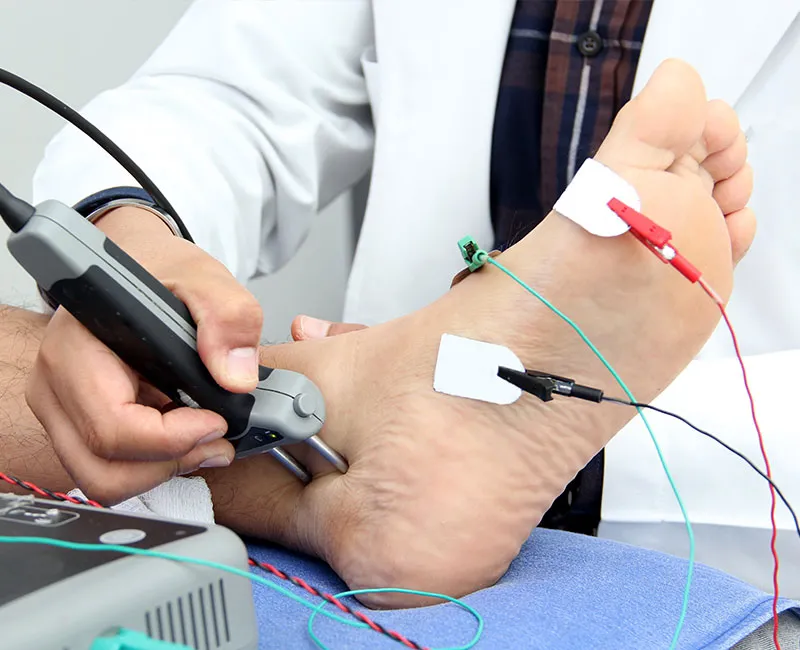


At Ashraya Hospital, we provide advanced neurological diagnostic services, including EEG (Electroencephalogram) and NCV (Nerve Conduction Velocity) tests. These tests are crucial in diagnosing and evaluating a wide range of neurological conditions such as epilepsy, neuropathy, nerve damage, and other brain-related disorders. With state-of-the-art technology and expert neurologists, we ensure accurate results to guide effective treatment.
Located in Wakad and Pimpri-Chinchwad, Ashraya Hospital is committed to offering the highest standards of care with patient-centred diagnostic services.
An EEG is a test that measures electrical activity in the brain. It’s used to diagnose conditions affecting brain function, such as:
How Does an EEG Work?
During the EEG, small sensors are placed on the scalp to detect electrical activity. The test is non-invasive and pain-free. The electrical activity is recorded on a computer screen for analysis by the neurologist.
NCV is a diagnostic test used to measure how fast electrical signals travel through the nerves. It’s primarily used to evaluate nerve damage or dysfunction, which is essential for diagnosing:
How Does NCV Work?
In this test, small electrodes are placed on the skin over the nerve. A mild electrical pulse is sent through the nerve, and the time it takes for the nerve to respond is measured. This helps determine if there is any nerve damage or abnormality.
Here’s why Ashraya Hospital is your trusted choice for neurological diagnostics in Wakad and Pimpri-Chinchwad:

We use the latest EEG and NCV diagnostic equipment to provide accurate and reliable test results.

Our skilled neurologists specialise in interpreting EEG and NCV results, ensuring precise diagnoses and tailored treatment plans.

We understand the importance of clear communication and compassionate care. Our team ensures that you’re comfortable and informed at every step.

Apart from EEG and NCV, we offer a full range of diagnostic services to assess your neurological health, including MRI, CT scans, and blood tests.
You should consider EEG or NCV testing if you experience any of the following:
If you're unsure whether you need these tests, our neurologists at Ashraya Hospital can guide you in determining the best course of action.
At Ashraya Hospital, we offer a holistic approach to neurological care:
If you or a loved one is experiencing symptoms that may require neurological testing, schedule an appointment with one of our expert neurologists today. Our EEG and NCV tests are quick, painless, and provide valuable insights into your brain and nerve health.
An EEG measures brain activity, while NCV evaluates the speed and function of nerve signals. Both are used for different neurological diagnoses.
An EEG usually takes between 30 minutes to an hour, depending on the complexity of the test.
No, NCV testing involves a mild electrical pulse, but it is generally not painful. Some people may feel a slight tingling or sensation during the test.
While both tests are very useful, they may not diagnose all neurological conditions. Additional tests may be needed for a comprehensive diagnosis.
For an EEG, avoid caffeine and hair products that may interfere with the sensors. For NCV testing, you may be asked to avoid certain medications or activities beforehand.